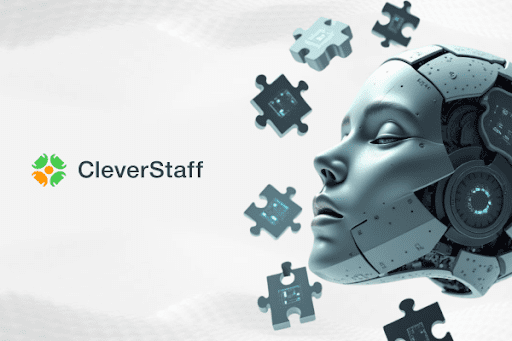AI in Recruiting: Trends and Reality
Artificial intelligence (AI) is gradually transforming many business areas, and the recruiting process is no exception. A few years ago, it seemed like something out of a sci-fi movie. Today, however, AI tools are actively helping recruiters optimize workflows, speed up candidate search, and improve the overall quality of hiring.
But how effective is this technology in practice? Where does it live up to expectations—and where should we be cautious?

AI in the Recruitment Process
AI is already actively used across industries like telecommunications, automotive, finance, education, and e-commerce. And AI recruitment is no different. There are notable examples of AI in recruiting — such as chatbots like Mya Systems, Wade & Wendy, and HireBot — which promise to automate sourcing, screening, and initial candidate communication.
However, according to James Michin, a consultant at the UK-based recruitment agency Pearn Kandola, AI in recruiting still has limitations. During interviews, it’s not just about what the candidate says, but how they say it — semantics, tone, and context all matter. In these moments, AI can miss nuances that a human recruiter would instinctively catch, drawing on experience and intuition.
Recruiters accumulate a wealth of non-digital information: temperament, emotional impressions, and attitude — much of which never gets logged into an ATS. Yet these human factors often influence the final hiring decision.
That’s why effective AI recruitment today depends on the synergy of technology, data analytics, and human empathy. One of the main drivers of this change has been the integration of AI hiring into applicant tracking systems (ATS).
Where AI in Recruiting Is Already Working
AI Automates Routine Tasks
AI is especially valuable in automating time-consuming processes like resume screening. Intelligent algorithms can analyze hundreds of resumes in seconds, ranking candidates by relevance and flagging key skills, talent and experience. This significantly reduces manual effort.
AI-powered chatbots for Initial Communication
Chatbots powered by AI now handle the first point of contact — collecting basic candidate info, answering FAQs, and conducting pre-screens. They’re available 24/7 and free up recruiters to focus on more strategic tasks.
Soft Skills Analysis
Some AI tools analyze speech, facial expressions, gestures, or writing styles to assess soft skills like leadership or communication. While this area is still developing and somewhat controversial, it offers interesting insights when used alongside traditional methods.
Voithos AI — Intelligent Assistant in CleverStaff for AI hiring
In 2024, CleverStaff introduced its built-in AI assistant — Voithos AI. It already provides significant value by enhancing pre-interview preparation and candidate analysis.
 For example, Voithos can suggest specific questions to ask a candidate when there are gaps or concerns about their skills or experience. It analyzes both the job description and the candidate’s profile, identifying areas that require further clarification.
For example, Voithos can suggest specific questions to ask a candidate when there are gaps or concerns about their skills or experience. It analyzes both the job description and the candidate’s profile, identifying areas that require further clarification.
Voithos AI supports recruiters at various stages — from Auto-Selection to Reviews and Found candidates — by recognizing job requirements and offering recommendations based on them.
An internal A/B test by CleverStaff showed that recruiters using Voithos AI increased hires by 18.4%, even with fewer interviews. Why? Because AI helps screen candidates more accurately, so only the most relevant ones move forward. This significantly reduces time-to-hire.
What Recruiters Gain with an AI-Powered ATS
- Time savings – AI handles resume parsing, filters, mailing, and status updates.
- Improved candidate interaction – Focus shifts from filtering to building relationships.
- Reduced subjectivity – When algorithms are well-tuned, bias decreases.
- Fewer errors – AI doesn’t forget or fatigue.
- Faster job closing – Thanks to efficient, automated screening.
- Strategic focus for HR – More time for analytics, planning, and long-term thinking.
It’s important to remember: that AI doesn’t replace recruiter — it amplifies them. The most effective outcomes come from combining AI with a well-tuned ATS. This reflects the market’s growing demand for fast, precise, and scalable recruitment solutions.
The Future of AI in HR: What You Can Do Today
- Master AI tools. You don’t need to be a developer, but understanding how AI scoring, ATS systems, or even ChatGPT works will put you ahead.
- Start small. Automate the basics — like resume parsing, email follow-ups, or candidate status tracking.
- Stay critical. Don’t rely blindly on AI. Use your experience and judgment to verify questionable outputs.
Impact of AI: Final Thoughts
AI in recruiting is already here — and it’s here to stay. While it won’t replace recruiters, it is reshaping their role. The recruiter of the future will be more of a strategist, analyst, and trusted advisor, not just a resume screener.
AI should be seen as a powerful tool, not a threat. When combined with ethics, human intuition, and experience, it enhances both recruiter productivity and candidate experience.
And for those already worried AI will send “classic recruiting” into the archives — don’t panic. New job roles are emerging: HR algorithm auditor, chatbot trainer, AI interaction manager, and more.
So let’s embrace the change, stay human — and let AI handle the heavy lifting. 😉